All vaccines approved in the United States and European Union still seem to provide a significant degree of protection against serious illness from Omicron, which is the most crucial goal. But only the Pfizer and Moderna shots, when reinforced by a booster, appear to have success at stopping infections, and these vaccines are unavailable in most of the world.
The other shots — including those from AstraZeneca, Johnson & Johnson and vaccines manufactured in China and Russia — do little to nothing to stop the spread of Omicron, early research shows. And because most countries have built their inoculation programs around these vaccines, the gap could have a profound impact on the course of the pandemic.
A global surge of infections in a world where billions of people remain unvaccinated not only threatens the health of vulnerable individuals but also increases the opportunity for the emergence of yet more variants. The disparity in the ability of countries to weather the pandemic will almost certainly deepen. And the news about limited vaccine efficacy against Omicron infection could depress demand for vaccination throughout the developing world, where many people are already hesitant or preoccupied with other health problems.
Most evidence so far is based on laboratory experiments, which do not capture the full range of the body’s immune response, and not from tracking the effect on real-world populations. The results are striking, however.
The Pfizer and Moderna shots use the new mRNA technology, which has consistently offered the best protection against infection with every variant. All the other vaccines are based on older methods of triggering an immune response.
The Chinese vaccines Sinopharm and Sinovac — which make up almost half of all shots delivered globally — offer almost zero protection from Omicron infection (as shown by Hong Kong results. China seems to be responding but with the normal response that the Chinese can do no wrong – as of Dec. 10, 120 million people in China have had a third vaccine dose, far short of the 1.16 billion who have had two, according to State media.)
The great majority of people in China have received these shots, which are also widely used in low-and middle-income countries such as Mexico and Brazil.
A preliminary effectiveness study in Britain found that the Oxford-AstraZeneca vaccine showed no ability to stop Omicron infection six months after vaccination. Ninety per cent of vaccinated people in India received this shot, under the brand name Covishield; it has also been widely used across much of sub-Saharan Africa, where Covax, the global Covid vaccine program, has distributed 67 million doses of it to 44 countries.
Researchers predict that Russia’s Sputnik vaccine, which is also being used in Africa and Latin America, will show similarly dismal rates of protection against Omicron.
Demand for the Johnson & Johnson vaccine had been surging in Africa, because its single-shot delivery regimen makes it easy to deliver in low-resource settings. But it too has shown a negligible ability to block Omicron infection
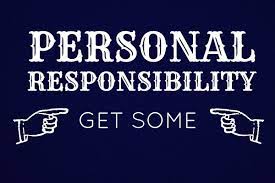 This excerpt from the New York Times this week says it all – at least for me. I have become sick and tired of politicians with little scientific knowledge and without any understanding of science – let alone public health – pontificating, when they are way out of their depth. The default position for ignorance is “personal responsibility”.
This excerpt from the New York Times this week says it all – at least for me. I have become sick and tired of politicians with little scientific knowledge and without any understanding of science – let alone public health – pontificating, when they are way out of their depth. The default position for ignorance is “personal responsibility”.
In other words, stay strong, stand up, shut your eyes tight and the good fairy will wash all the nasty virus way. Here is where our Opus Dei indoctrinated at last comes together into a rapturous relationship with a Pentecostal creationist. As a result, the mob is permitted to rule – that ragtag group of conspiracy theorists, anti-vaxxers and downright seditionists.
The problem is the definition of “personal responsibility” – the mob does not shriek “personal responsibility” but rather “freedom” as their catchcry.
The NYT article is clear. Without the booster, AZ vaccine is useless in the face of omicron – the Moderna booster seems to be stronger than Pfizer. However, the difference between the efficacy of the various mRNA vaccines is somewhat academic against this rise of a new variant, as it does sounding time to ditch the old technology upon which AZ and the other vaccines are based.
The problem is that there should be any argument about when to give the booster, when one realises that perhaps six million plus of those vaccinated in Australia have had the AZ vaccine. If omicron is spreading as rapidly as has been foreshadowed overseas, then Australia is facing the same situation as it did when the vaccination rates were low or non-existent. It is estimated that about seven per cent of the population have had a booster; might I include Morrison?
It is useless to point at any one piece of data and claim that Australia is not vulnerable, especially when the governments are doing everything wrong in stopping the spread. Remember when the volume of testing was used as the talisman of success; now the same statistic is being demonised. Have any of the politicians thought, from their privileged position riding in a government car at our expense, how buggered the health workforce is, with an even more contagious invasion of the Virus?
The root problem of Australia’s plight is that a basically unintelligent Prime Minister, who is hooked on the media release, in effect shirked his quarantine responsibility from the onset, and allowed each State to set their own rules. Morrison’s instincts are to wedge, divide and in this case he has been very successful. It was only the efforts of some of the public health doctors that have kept Australia from succumbing to a Boris-blathering shamble.
No mandates, Prime Minister. Well let us extend your now more confident stance – for instance, no need to wear seat belts, no need to have any rules in relation to car maintenance, no traffic lights, no pedestrian crossings, no speed limits, no need to bother about which side of the road you drive on, no limits on alcohol consumption while driving. They are just matters for personal responsibility!
As the you say, Prime Minister, it is a matter of personal responsibility. No mandates – let’s roll back the years of public health skills and experience. Why not in road safety as well – and, for that matter, in child entertainment facilities?
His recent comparison of the pandemic with sunburn is risible. For one thing sunburn, when I last read about it, is not infectious. If you burn yourself in the sun, it is one’s responsibility – alone.
As you say, “brothers and sisters do whatever you like – but do it responsibly – like my mate Boris!”
But you will excuse me if I repeat what Leo Amery said, pointing at Neville Chamberlain in the House of Commons: “In the name of God, go”. It was 7th May 1940. The evacuation from Dunkirk was less than three weeks later. By that time there was a new Prime Minister.
The Narcissist in the Pork Barrel with a mark of the Ear
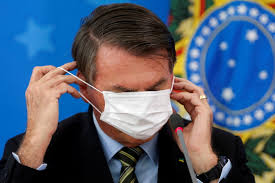
I have wondered what life would be like living under Jair Bolsonaro, one of the most active facilitators of COVID-19 spread, indicative of deeply narcissistic personality coupled with a profound suspicion of anyone more intelligent than himself. From afar it looked like a nightmare, where the leader of the nation was so convinced of his own thinking that it excluded any contrary view. Translated is that the “Bolsonaros” do not come to terms with loss of power and will do anything to maintain that power.
On the other hand, the conventional political wisdom is consistent with Mayhew’s analysis: both constituents and members of US Congress excoriate earmarks (a.k.a. Pork Barrel) as pork only when they are in someone else’s district. If that is true, anti-pork campaigns might result in a variation on Richard Fenno’s familiar paradox: we hate Congress for being so wasteful but love our own representatives for meeting our district’s needs so effectively. If that is the case, then the politicians receive electoral benefits from the earmarks, a.k.a. pork barrel, for which they claim public credit.
Mayhew and Levinger argued that the size of individuals’ networks affects the amount of time individuals interact with each member of their network, because humans have limited time and resources. Individuals in larger networks, such as urban centres, are in contact with more individuals than individuals in smaller networks. Consequently, they may devote less time to each interaction or forgo interactions that are less important. The pork barrel process acts as a lubricant for such constituents.
Yet Andrew Leigh, an Australian politician, the ALP member for Fenner in Melbourne, has studied the effect of pork barrelling on electorate behaviour. He found that the sporting rorts affair did not materially affect voting behaviour.
However, in reconciling the American sociologists with Leigh, I wonder whether he has looked at the recent allocation of Federal government funding to the outer Sydney electorate of Lindsay, centred on Penrith. What is clear is that while there are some large grants, there are many small grants there, each attracting an inner glow in a small cohort of people until the number of grants accumulates a degree of rosiness abut the government handing out freely the money of us “mug taxpayers” as its largesse.
When does the grant have to be small enough to just constitute a bribe, because that is what most of these grants are? Obviously small grants have a multiplier effect far in excess of large grants given to big companies. The large grants to “the big end of town” are often reflective of the same level of corruption, these grants often resulting in grateful kickbacks to the particular political party to sustain electoral viability.
Thus, it is a different order of magnitude and, may I suggest, serves the same purpose as the local PNG politician shelling out ten kina notes. Where is the difference between the politicians in Papua New Guinea and those in Australia? After all, the PNG politician could easily write a brief justification for “the horticultural developmental project to grow betel nut … or whatever”. But they don’t bother – just hand out cash in exchange for your vote. No humbug there. Bribery is bribery.
But then I don’t think of Melanesians as narcissists.
Out of Africa
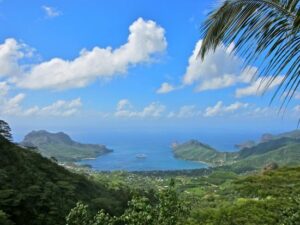
Christmas comes in various places. For a number of years, Christmas for us was always a different place in the world. Once we were in Taiohae in the Marquesas, where Christmas dinner was a pig cooked in an umu, Christmas in London in a suite at the Savoy, gazing down the twinkling Thames; yet another in Santa Fe with the farolitos and luminaria guiding us through snow-strewn streets, with a temperature well below zero, to attend a Navaho Mass.
Most of them are associated with an anecdote, but the strangest Christmas morning occurred in Kenya. As part of a search for Africa, we first went to Africa in the late 80s. It was a time when South Africa was still out of bounds and Australian flights terminated in Harare. Then we travelled round East Africa with our last port of call which I mentioned in a recent blog being the Seychelles, before a flight to Singapore; thence back to Australia.
Little did we know that this was to herald many trips to the African continent over the next three decades. However, at that Christmas we had gone to stay at Little Governors camp in the Masai Mara, a national park about 2,000 metres above sea level. We were there at a time of the “short rains” in December, and it was very wet underfoot. The streams filled with hippopotami were overflowing, and in the camp it was hard to keep dry. Even when they are characterised as “short”, they are significant downpours, and one such was on Christmas morning. We soon found after all the exchanges of Seasons’ Greetings that we had been invited to visit a Masai village that morning.
During our stay, the local Masai guarded our camp, tall silent men with spears, ostensibly there to protect visitors when the elephants walk through the camp, really to stop idiot visitors wandering out into the path of the elephants – you don’t stop elephants. As we found out on a later African visit, when we were awakened by our tent being vigorously shaken by a young bull elephant wanting to tuck into the leaves on the tree which served as a strut for our tent. No Masai warriors there.
The Masai are very tall and have a spiritual belief about ownership of cattle being a responsibility which has been given to them, although I was never clear how far that mandate extends. Their villages consist of a cluster of circular huts with a shallow thatched roof. The walls are mudbrick, discoloured a brown from cow dung in the mud. Cow dung seems to constitute an unescapable factor of Masai life, as we got out of the vehicle into a slurry of dung, which threatened to engulf our boots. This was not high heel country where you could be a dashing figure in safari suit with cravat and bush hat. I mention that because the regal Masai away from the reality of existence has, in the pages of a Vogue spread, become the model of the noble savage.
In this case we, the visitors, were treated with dancing; the men with the two-dimensional jumping up and down brandishing spears; the women dancing to accentuate the beadwork which festooned their throats and wrists in the main. Some singing, although I cannot remember whether the women actually ululated that morning. Anyway, we were not burdened by holly and ivy encrusted carols.
The shuka is the caftan-like robe the Masai all wear. It is essentially a rough cotton. In fact, as one source puts it, the word “traditional” must be taken with a grain of salt. Before the colonisation of Africa, the Masai wore leather garments. They only began to replace calf hides and sheep skin with commercial cotton cloth in the 1960s.

But how and why they chose shuka cloth is still unclear today. There are a few schools of thought. One of them is traced back through centuries — fabrics were used as a means of payment during the slave trade and landed in East Africa, while black, blue, and red natural dyes were obtained from Madagascar. There are records of red-and-blue checked “guinea cloth” becoming very popular in West Africa during the 18th century. Some of the cloth resembles tartan, and the incursion of Scottish missionaries into the Masai lands is said to be the culprit.
Whatever the source, it was all very colourful; and the Masai are not shy in coming forward flogging their beads inter alia. Thus, we come back with an assortment of beaded geegaws; and I wondered why we hadn’t bought any axes and mirrors.
Did not see this visit reported in the Australian Media
Indonesia is our closest Asian neighbour. It is a cultural rendang – so many ingredients, yet the Australian perspective is of Bali as an offshore resort where Australians just carry on their lifestyle – but more clearly. The Australian personality easily accommodates the beachcomber, surfer or not. I have a son who, in his younger years, would go surfing around Indonesia, mostly off Sumatra.
Yet Indonesia the country may as well be in a different galaxy, so little the normal Australian knows about it. For some reason the rapidly irrelevant Great Britain gets extensive media coverage, yet Indonesia, only when there is a disaster. It may be attributed to the fact that we neither share common language, culture nor, as is increasingly important, common sporting activities. Indonesians see us as an educational destination, but otherwise as reported, the average Indonesian shows little interest in Australia (except when rent-a-crowd is assembled outside the Australian Embassy when we are perceived to have insulted somebody or something sacred).
Yet looking at the content of the recent Blinken visit, I would have thought it would have aroused interest in Australia, especially since our government has been a strident supporter of the USA. His visit to Indonesia came days after that of a senior diplomat from Russia. Yet the Blinken visit is designed to begin winning back American support which lay fallow under Trump, while the Chinese pressed ahead. One chink in the aid program from China has been the use of the relatively ineffective Chinese vaccines, where the availability of a booster will be all important for those already vaccinated with the Chinese vaccine.
At least when the Blinken entourage inevitably became infected with COVID and aborted its visit, the West Australian reported it. Will that be the harbinger of things to come – half-built relationship eroded by the virus of libertarian hogwash and conspiracy theory?
Unless a significant cohort of Indonesians or, more importantly their children, are welcomed to Australia to embed the culture and the ability to communicate effectively, with correspondents who have their roots in Australia, then Indonesia will still continue to be Bali – offset by the burning threat of terrorism.
But Indonesia and, for that matter, the other Malay countries are so much more.
As I write, my eyes are fixed on the lively presenters on ABC breakfast television, Fauziah Ibrahim and Iskander Razak, obviously of Malay heritage with the name suggesting a Muslim upbringing. Yet where do they come from? Singapore, probably the country closest to a European way of doing things.
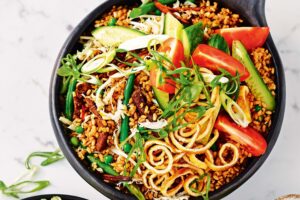
I wonder whether they are conversant with the Malay language, including Bahasa. I still remember baik baik saja from a tentative period when learning Bahasa and eating nasi goreng was quite a fad. Then the ABC actually ran programs teaching the language; not having it sequestered in SBS where the aim is a self-conscious “multi-culturalism”, not necessarily enhancing multi-cultural communication.
But as reported…
Downplaying direct confrontation between the United States and China, Secretary of State Antony Blinken on Tuesday pledged to strengthen relations with Indo-Pacific nations through billions of dollars in US investment and aid and, in doing so, counter Beijing’s regional pull.
That soft-power pitch was delivered at Universitas Indonesia in Jakarta, the country’s capital, and continued with a series of agreements on maritime cooperation and education and Peace Corps exchanges. The university was also the site of a speech nearly 60 years ago by Robert F. Kennedy, who spoke then of open relations among states, so long as one did not threaten the rights of others.
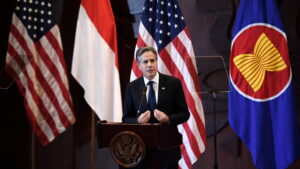
Blinken called it remarkable that the broader goal had changed so little for a region that now accounts for 60 percent of the global economy and is growing faster than anywhere else in the world. The Indo-Pacific covers countries primarily in the Indian Ocean region, including India, Australia, Japan and the Association of Southeast Asian Nations, or ASEAN.
“We all have a stake in ensuring that the world’s most dynamic region is free from coercion and accessible to all,” he said. “This is good for people across the region, and it’s good for Americans, because history shows that when this vast region is free and open, America is more secure and more prosperous.”
But China, the regional heavyweight, overshadows US trade in nearly every country in the Indo-Pacific. In Southeast Asia alone, two-way trade with China reached $685 billion in 2020, more than double that of the region’s trade with the United States.
China’s Belt and Road Initiative, which is aimed at building infrastructure like ports, railway lines, and roads around the world, has continued to make inroads in Southeast Asia even during the pandemic. This month, Laos completed its first high-speed railway, a $6 billion project backed by China. A few weeks before that, Vietnam opened its first metro line in Hanoi, also thanks to China. And in Indonesia, China has spent billions of dollars to build high-speed rail lines, power plants, dams, and highways.
“The Achilles’ heel of US policy remains economic engagement, with China far outpacing the US in trade and infrastructure investment,” said Jonathan Stromseth, a Southeast Asia expert and senior fellow at the Brookings Institution.
Unlike his predecessor, President Biden has avoided directly pressuring other nations to choose between partnering with either the United States or China on a host of issues. Still, Stromseth said, parallel efforts by China and the United States to outdo each other risks “that a bipolar divide is hardening for the long term, with potentially serious consequences for regional stability and development.”
China has stepped up its military operations in the Indo-Pacific, with warplanes flying over parts of Taiwan and staking claims over disputed territory in the South China Sea. These actions, among others, have put the Pentagon on alert.
Blinken said bluntly, “We don’t want conflict in the Indo-Pacific.” Yet he also described “much concern” in the region over Beijing’s actions, which he said has distorted open markets with state-subsidized products, limited trade by its adversaries and engaged in illegal fishing.
“Countries across the region want this behaviour to change,” Blinken said. “We do too.”
Blinken’s main message was that the United States is a better bet as a partner than China.
He said the United States had donated 300 million coronavirus vaccines — one-third of its worldwide contribution — to the Indo-Pacific and would continue to invest billions of dollars in its public health systems.
The vaccines, which Blinken said were given “with no strings attached,” may prove to be the United States’ main leverage in Southeast Asia, as hundreds of millions of doses sent by Chinese companies have been found to be largely ineffective against the delta variant.
On climate, Blinken noted a $500 million commitment to help finance a solar manufacturing facility in India as among efforts to help the region stave off environmental crises without disrupting economies. He pledged to pursue agreements to bolster data privacy and secure technology used in economic transactions, “because if we don’t shape them, others will.”
And he said the Biden administration would work to ease snarls in the global goods supply chain in a region that buys nearly one-third of all US exports.
Across Southeast Asia, private investments by the United States amounted to $328.5 billion in 2020, outpacing China.
“The region has told us loud and clear that it wants us to do more,” Blinken said. “We’ll meet that call.”
Blinken’s visit to Indonesia, the largest country in the Association of Southeast Asian Nations, was viewed as overdue: Neither Vice President Kamala Harris nor Defense Secretary Lloyd Austin stopped here in recent travels to the region. In a fresh reminder of the nation’s strategic value, Blinken arrived only a few hours after Nikolai Patrushev, the secretary of the Kremlin’s Security Council; their planes were parked next to each other at Jakarta’s airport.
Blinken’s speech was well received by some within Indonesia. Tom Lembong, who was Indonesia’s trade minister from 2015 to 2016, said it “hit the bull’s-eye on what policy makers across ASEAN want, which is concrete and practical solutions, and less of the soaring rhetoric that has dominated American official engagement with Southeast Asia over the last two decades.”
“I would argue that at this time, the Biden administration is succeeding in Southeast Asia — they’re regaining lost ground and making up for lost time,” Lembong said in an e-mail.
Many countries in Southeast Asia remain wary of being drawn into a Cold-War standoff between the United States and China. In November, Prime Minister Lee Hsien Loong of Singapore indicated that he was uncomfortable with Biden’s calls to persuade leaders from democracies to present a more unified front against China.
“We all want to work together with the US,” Lee said in a November interview with Bloomberg News. But, he added, “I think not very many countries would like to join a coalition against those who have been excluded, chief of whom would be China.”
The region is split between countries that are friendlier with China, like Cambodia and Laos, and others that are more hard-line, such as Vietnam. In previous years, the bloc of Southeast Asian states has been torn about how to address the dispute in the South China Sea, with some nations not wanting to offend Beijing.
“The sin of China is undermining and breaking up ASEAN,” said Kasit Piromya, who was Thailand’s foreign minister from 2008 to 2011. “China has the money, they are rich and have their projects and initiatives. But that doesn’t mean that we have to be their doormat. I think we are terrified of China, but this is not based on reality.

Finally, from us all here with Blinken, Wynken and Nod, Selamat Hari Natal.”
Mouse Whisper
A sidelight of “Holiday Inn”, the 1942 version of a White Christmas. For snow, it used chrysotile asbestos. As Bing Crosby sang “White Christmas”, the asbestos was falling all around … “like the one I used to know.”

